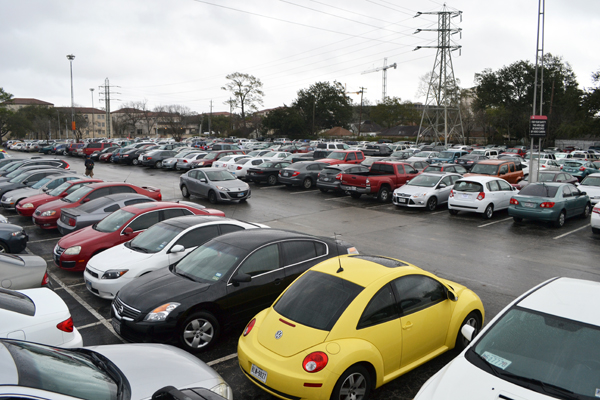

Director of Parking and Transportation Robert Browand said that the COAST program has helped commuters from suburban areas such as Katy and Cypress. | File photo/The Cougar
Parking at the University of Houston has never been fun.
With more than 43,500 students, 85 percent of them commute from off campus, which means that around 37,000 students need a mode of transportation other than walking to get to class.
Robert Browand, director of Parking and Transportation Services, said garage permits for 2017-18 sold out over the summer, and student annual permits sold out the weekend before classes began.
“We have yet to sell out of remote campus permits, so any students who wants to purchase a permit have the opportunity to do so,” Browand said.
The remote campus permit allows purchasers to park at the Energy Research Park, or ERP, on weekdays, and in a variety of main campus lots after 4 p.m. and on weekends.
Getting to campus, however, requires a long walk or waiting for a shuttle.
Alternative options
PTS knows the struggles students have been facing, which is why it implemented in 2016 the Cougars On Alternative And Sustainable Transportation, or COAST, program — an incentive that has reduced the demand for parking on campus by offering carpooling and public transportation discounts, Browand said.
COAST has 2,825 participants this year, he said, reducing demand for on-campus parking by more than 1,500 spaces — slightly more than the number of cars that can park at the East Garage.
Even though this program has helped some, many students still face problems finding a parking spot.
Computer engineering technology junior Lan Trinh drives from Sugar Land and has the student annual permit. He said finding parking has impacted his commuting time.
“My commuting time is around 45 minutes, but with traffic is around two hours,” Trinh said.
Trinh said that the longest time he has spent trying to find a parking spot is an hour and a half.
The issue with finding parking spaces, however, is not as difficult for some students, such as biology freshman Juan Mendez, who purchased a garage pass.
“I have a garage pass, so parking is a little bit different than student lots,” Mendez said. “I still have to get to school early in order to avoid parking on the top level of the garage and having to walk all the stairs.”
To accommodate the growing UH population, Browand said PTS is looking into options that include new garages.
“Planning is underway on our next parking garage — Garage Five — to be located in lot 18A near the law school,” Browand said. “Our plans also include the construction of Garages Six and Seven over the next several years and the addition of parking at the MacGregor tract to ease congestion during the construction of these garages.”
Browand said COAST will have the biggest impact on parking, and that the program has mostly helped students who live in suburban areas such as Katy.
“Three of our top 10 zip codes with the highest number of COAST participants are in the Katy area, and nine of the top 15 are in suburban areas including Cypress, Jersey Village and Missouri City,” Browand said in an email.
Browand said that they are also looking into the possibility of valet parking, which would be implemented into certain areas on campus at peak times in order to help students arrive quickly to class, he said.
Pushing parking counters
Student Government Association President Winni Zhang said that circling lots to find parking is what frustrates students the most, along with the parking spaces being too small and a lack of security in the lots.
“Parking has been a big issue ever since I stepped foot on campus,” Zhang said. “They need to introduce more creative ways to decrease the time it takes to find parking.”
SGA is working closely with the Division of Administration and Finance on a lot of issues, and parking is one of those, Zhang said. While campaigning in the spring, she told students she wants to install real-time counters outside all parking lots.
Browand and Zhang both agree that the COAST program has helped students regarding transportation.
“Students have overall expressed to me their support for the program,” Zhang said. “The program is growing much faster than Parking and Transportation originally thought it would be.”
Oversold permits
Browand thinks overselling is a commonly misunderstood practice across college campuses.
Universities sell more passes than parking spots because students and staff have varying schedules, Browand said. One student may go to campus only on Mondays and Wednesdays, while another attends only Tuesdays and Thursdays.
“Overselling allows us to issue both students a permit because they can utilize the same space on different days,” he said. “If we did not oversell, we would only be able to issue 60 percent of the permits we currently issue.”
Browand said PTS is operating at its lowest overselling rate in 10 years.
“At 1.58 permits per space, we are on the low side of industry-best practices and well below peer institutions in the state,” Browand said.
Future parking prices are still being discussed. Browand said permit prices are set in coordination with the Transportation and Parking Advisory Committee, which is composed of members from SGA, Faculty Senate and Staff Council.
For now, Browand advises students to enroll in the COAST program.
“We are sensitive to the cost of higher education, and that is why we are proud to offer COAST as a low- or no-cost option for students seeking a more economical option for commuting,” Browand said. “COAST helps our department ensure that the cost of transportation should never be a factor in a student’s pursuit of higher education.”
news@thedailycougar.com
—
“Despite new program, parking still a struggle, students say” was originally posted on The Daily Cougar
